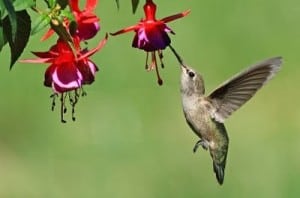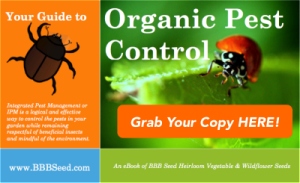Decreasing Chemical Usage
 What do you do at the first sign of a beetle on your squash flowers or a caterpillar on your tomatoes? Your actions will affect the health of the beneficial pollinators in your yard. Nature has a variety of methods to aid in the control of insect invasions on your plants, whether flowers, vegetables, grains or trees and bushes.
What do you do at the first sign of a beetle on your squash flowers or a caterpillar on your tomatoes? Your actions will affect the health of the beneficial pollinators in your yard. Nature has a variety of methods to aid in the control of insect invasions on your plants, whether flowers, vegetables, grains or trees and bushes.
1. Wait – don’t jump for the insecticide. Here is what the President of the Colorado State Bee Keepers Assoc., Beth Conrey, says about insecticides:
Insecticides are a pesticide that kills insects. There are many types of insects. Some are detrimental, such as the mosquito, which spreads deadly diseases. Some are beneficial, such as the honey bee, which is responsible for the pollination of many of the plants that we depend upon for our diet.
There are many different kinds of insecticides. Broad spectrum insecticides kill any insect that they come in contact with–beneficial or detrimental. Target insecticides are formulated to kill just certain species of insects. Colony collapse disorder, CCD, was defined in 2008. There are many causes which are being examined but one of the primary focus area for many researchers was a certain class of insecticide that appeared at the same time–neonicotinoids.
The bottom line remains the same, whether you believe neonicotinoids are part of the problem or not: Bees, and other beneficial pollinators, are dying in record numbers. Pesticides, particularly insecticides but also herbicides (think Roundup) and fungicides, are part of the problem. Reducing or eliminating their use in your lawn and garden will only benefit these insects and all of the higher layers of the food chain that depend on them–YOU!
EDUCATE YOURSELF — CHECK OUT THE CSBA’s extensive list of pesticides and their effects on pollinators, honey bees, humans and the environment.
Download the Guide to Organic Pest Control here:

Practicing Integrated Pest Management (IPM)
…… is a strategy of controlling insect pests through a variety of alternative practices with chemical controls (read insecticide) being the LAST step in the process NOT THE FIRST.
Please learn more about integrated pest management by clicking on the links below:
- Colorado IPM Center: http://coloradoipmcenter.agsci.colostate.edu/
- Western IPM center: http://www.wrpmc.ucdavis.edu/
- High Plains IPM (great for ag crop IPM): http://wiki.bugwood.org/HPIPM:Main_Page
- http://www.epa.gov/pesticides/factsheets/ipm.htm
- http://www.whatisipm.org/
- http://www.spcpweb.org/factsheets/NaturalLawnCareforHomeowners.pdf
- US Fish and Wildlife Center ‘Reducing Risks to Pollinators from Pest Control’

